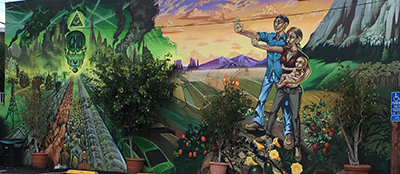In this section, Professor McLaughlin shares how he uses scientific literature to raise students’ awareness of the hard dilemmas in the field.
Learning to Appreciate Complexities
One of the interesting things about the course, and a challenging thing for me as a teacher, is that with a lot of the topics we discuss students come in with opinions already, and they can say things in a seminar that are based on just their common knowledge and not on the readings. But when they start to read the scientific papers, they realize that the issues aren’t really so much what they learned about in everyday life before the course.

An anti-GMO mural. (Courtesy of hikinghillman on Flickr. CC BY-NC)
For example, when it comes to GMOs, the focus of most of the students is, “Will GMOs hurt me? Are they going to cause me to have cancer?” And that’s really not the scientific perspective on the issue, because there’s almost no evidence that any GMOs are harmful to human health. The problem is what GMOs do to the ecosystem, and what they do to other plants that are not genetically manipulated, and what their unintended consequences may be. Because GMOs are generally designed to help the farmer be more productive, and most GMOs are designed to resist pests. And there have been examples—for example, papayas in Hawaii—where indigenous farmers who were very organic and very against GMOs eventually turned to GMOs because otherwise they would have totally lost their crop to pests.
When we start to talk about GMOs as a way to reduce pest losses for poor farmers who cultivate less than an acre of land, students realize there’s more than one side to the story. There have been some interesting studies suggesting that laws in the EU restricting GMOs are actually negatively influencing food security in Africa because they have discouraged development of GMOs in countries where there really is a shortage of food. Generally the students learn that most of these issues are more subtle and complex than they thought when they came into the class. By the end of the course, people’s opinions are usually not as polarized as they were in the beginning.
Presenting the Controversy
One thing many of them are not used to—even some of the graduate students—is that there’s a lot of controversy about things like organic farming and whether or not we should be willing to sacrifice yield a bit to have more sustainable agriculture.
Can we really feed everybody with organic techniques? That’s the kind of dilemma that requires us to go beyond just saying, “This is just a beautiful way to produce that works with nature.” If we work totally with nature—this is a question I pose to the class—could we be feeding 7 ½ billion people on this planet? The answer is probably not. Specialists in nitrogen chemistry and agriculture estimate that without the Haber process, which converts atmospheric nitrogen to fertilizer, we could feed about 2 billion fewer people.
The Haber process is a big contributor of greenhouse gas. You have to burn methane to make the ammonia, and it also takes a lot of energy because the reactions happen at a very high temperature. So we can say, “That’s not working with nature. That’s not sustainable.” OK. Which 2 billion people are you not going to feed? That’s how I pose it to the class.
"Students think the challenge of an education is to learn the facts that they’re being taught. Then they discover that there are differences of opinion even among experts, and that there are value judgments and social equity questions and all kinds of things."
The students read the scientific papers, and we try to discuss both sides of an argument based on the merits. I’m not saying students don’t get exposure to that kind of thing elsewhere, but if they’re taking physics and learning about Newton’s laws, it’s not presented as a controversy.
Students, especially undergrads, are used to going into class and thinking they’re learning “facts,” and that’s the end of the story. They think the challenge of an education is to learn the facts they’re being taught. Then they discover that there are differences of opinion even among experts, and that there are value judgments and social equity questions and all kinds of things. We’re certainly trying to do that in the classroom. But it’s not so easy; it takes the students off balance a bit.










